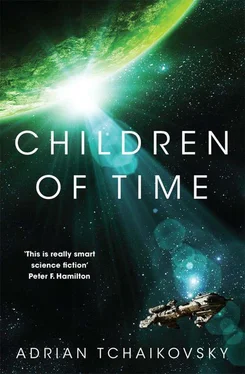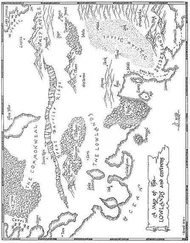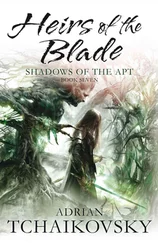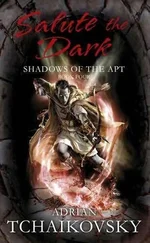With Fabian taking the lead, the spiders ambush an ant logging party, trapping and killing them quickly and efficiently, then decapitating them and dissecting them for their scent glands. The ants are smaller than Portia – between fifteen and thirty centimetres long – and the spiders are stronger, swifter and far more efficient fighters, one on one. What they must avoid is a general alarm, where large sections of the colonies are mobilized against them.
The ants communicate principally by pheromones – to Portia’s keen chemical senses the air is thick with them. They use the ants’ scent to disguise their own, and they carry the severed heads with them, secured to their abdomens. In extremis they can try to divert ant attention by a morbid form of puppetry, manipulating the dead antennae of their victims in a pretence of communication.
They travel swiftly. Their victims will be missed, but the initial response will target where they were, not where they are now. Their road is the high one. They travel through the upper reaches of the ants’ plantations, and whenever they reach a firebreak, one of them scuttles across the intervening ground with a thread that then forms the spine of a temporary bridge. With their own scent disguised, they travel over the ants’ heads and beneath their notice.
Fabian demonstrates that the protrusions on the trunks of the ant-tended trees can be lanced with a fang to release a sweet, nourishing liquid not unlike the honeydew of aphids, a taste they know the ants relish. This plantation agriculture is obviously a useful secret, and Portia adds it to the list of observations to include in her report when she returns home.
For now, they press on towards the main colony mound, avoiding the ants where they can, killing them swiftly where they cannot. Each small alarm will contribute to a generally raised awareness across the nest, until significant insect resources are devoted to locating intruders whose presence has been deduced by the colony’s ineluctable internal logic.
Portia’s goal is to investigate the central colony mound, which promises more secrets. During the day the air shimmers over parts of it, and there are plumes of smoke venting from stubby chimneys. At night, some of the ants’ entrances glow dimly.
In the darkness of their home, the ants start fires in the oxygen-rich atmosphere, ignited by exothermic reactions from chemicals that certain of their castes can produce. Complex arrangements of internal passageways use the temperature differentials to stimulate airflow: heating, cooling and oxygenating their nests. The ants also use fire for land clearance, and as a weapon.
Portia’s world – the underlying geology that existed before the terraforming – is rich in shallow deposits of metals, and the ants dig deep to build their nests. In this colony, centuries of burning has led to charcoal production, and occasional inadvertent smelting has been systematized into the forging of tools. The blind watchmaker has been busy.
Entering the mound itself is more than Portia dares, and she is tempted to leave with all the information she has gathered. Curiosity urges her on, though. Atop the mound, beneath the hanging shroud of smoke, is a spire that gleams in the sun brightly enough to draw the eye. Like all of her kind, she is driven to investigate anything new. This reflective beacon is the highest point on the mound, and Portia wants to know what it is.
Portia finds her band of infiltrators a vantage point in the nearest plantation to the mound and considers the paths taken by the chains of ant workers. Inside the brain that bulks out the underside of her body, she has fallen into a way of thinking that her diminutive ancestress would recognize: constructing an internal map of the world, and then deconstructing that to find the best course to where she needs to go next.
I will go alone , she instructs Bianca. If I do not return, then you must go home and report.
Bianca understands.
Portia descends by line from the tree that provided her watchtower, and begins her journey, following the itinerary that she spent so long plotting. The ants follow particular paths that their constant travel has packed down into flat, smooth roads representing the most efficient routes. Portia navigates a delicate, cautious path between these thoroughfares. She moves haltingly, pausing, quivering, then drifting on, gauging the lightly gusting wind and letting her onward progress follow its patterns, as if she herself was nothing but some overlarge piece of wind-blown debris. The vibrations of her movement are swallowed up in the entropy of the world at large. With her scent disguised, she can ghost past the near-blind ants as though she is invisible.
The going gets more complex and more dangerous as she reaches the mound itself. Her careful plan knows constant amendment, and she comes close to discovery several times. Once she uses the detached head of one of her victims, in a brief moment of feigned contact, to put off a wandering cleaner who is paying too close attention to her.
Her painstaking progress has taken hours, and the sun has set. This leads to outdoor ant activity dropping off, and makes her progress easier; only then does she reach the summit.
The ants have built a stumpy spire here, as already observed, and atop it is something new: a pale crystal that gleams translucently in the moonlight. She has no idea what this is for, and so she waits in the hope that the ants themselves will show her.
After the moon begins to dip towards the far horizon, they do. All of a sudden there are ants issuing out on to the mound’s summit in considerable numbers, so that Portia must move rapidly, and keep moving until she has found somewhere that they do not intend to occupy, which means some way further back down the shallow gradient. The insects are forming a carpet, a net of their bodies, touching antennae and limbs. Portia is baffled.
They seem to be awaiting something – or that is how she interprets their behaviour. It is un-antlike. It concerns her.
Then another of the insects emerges from a small hole at the base of the spire and climbs up it. It flicks one antennae towards the crystal, with the other directed downwards to make contact with the general host gathered below it. Portia’s wide, round eyes gather as much of the moonlight as they can, and focus on this newcomer: this small, unprepossessing ant. It has a prosthesis on its antenna, like the tree-cutters, but this is a fine cap of the same material – metal, though Portia does not know that – that tapers to invisibility, so that the ant is now touching the crystal with a tiny, delicate, hair-like wire.
And, as Portia watches, the ants begin to dance.
She has never seen anything like it. Shivers go through the entire mat of them, apparently originating in that contact between metal feeler and crystal, and spreading through the assembled host. They are sent into constant waves of motion, each transmitting to its neighbours some rhythmic message that holds the entire congregation rapt.
Portia watches in quiet bewilderment.
She is no mathematician. She does not quite grasp the series of arithmetical progressions, series and transformations that are represented in the waves of motion passing through the ants – no more than the ants themselves do – but she can grasp that there is some pattern there, some significance to what she is seeing.
She does her best to interpret what she sees in light of her experiences, and those experiences she has inherited, but there is nothing comparable in the whole history of her own world. The ants feel the same. Their constant exploration of possibilities has resulted in this solitary contact with something vast and intangible, and the colony processes the information it receives and attempts to find a purpose for it, more and more of its biological processing power being applied to the task, more and more ants quivering under the pulsed rhythms of a distant radio signal.
Читать дальше












